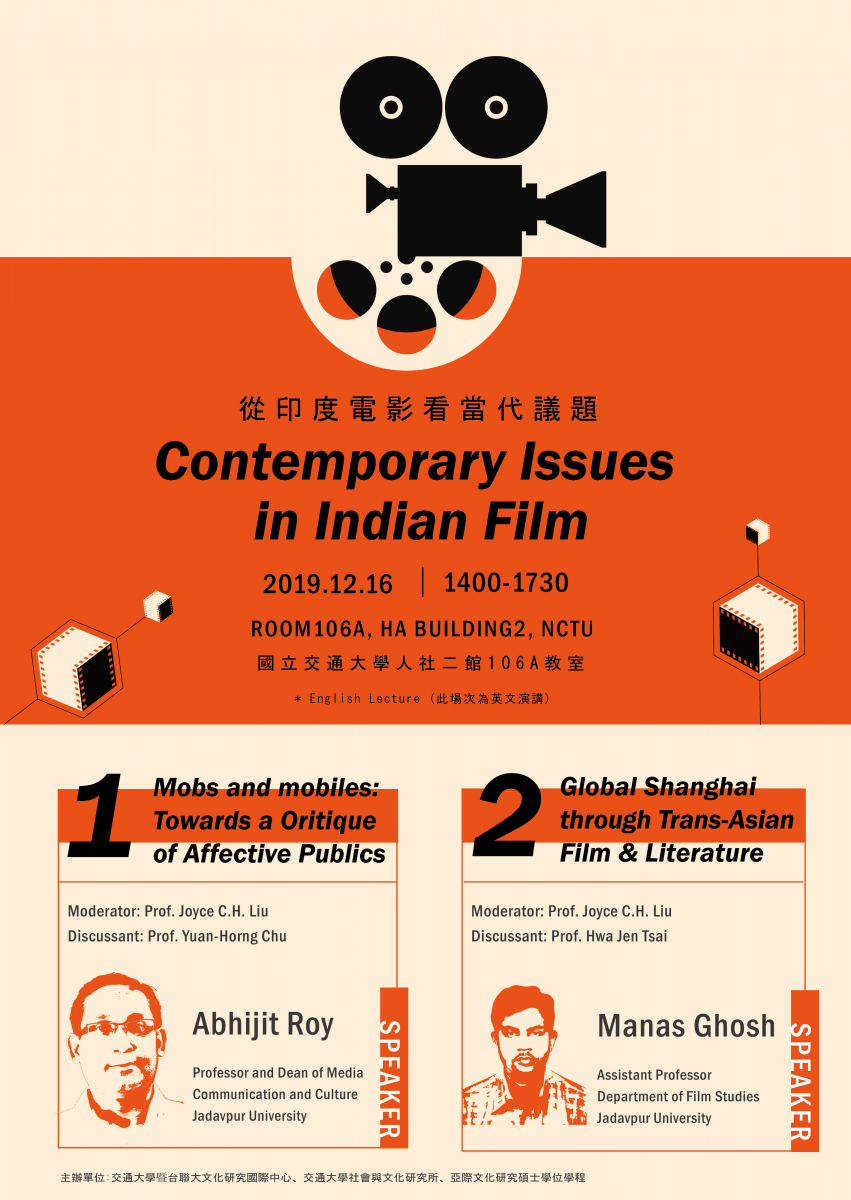


2019-12-16 - 2019-12-31
Date: 2019.12.16 MON
Time: 14:00-17:30
Venue: HA Building 2 R106A, NCTU (交大人社二館106A教室)
Talk 1:
Mobs and mobiles: Towards a critique of affective publics
Speaker: Abhijit Roy (Professor and Dean of Media, Communication and Culture, Jadavpur University)
Moderator:Prof. Joyce C.H. Liu
Discussant: Prof. Yuan-Horng Chu
This talk would like to present a critical agenda for studying emergent forms of publicness in India in relation to the circulation of information across electronic and social media. I use ‘information’ in a very elementary sense of anything that circulates as a ‘fact’. It may or may not refer to a real happening, but it must appear (read/look/sound) to contain an element of truth, circulating in a range of forms from news on television channels to memes and fake news across social media. The paper explores why mobile phones generate certain user-behaviour of quickly forwarding such information without checking, creating conditions for rumour and lynch mobs in India. Can we say that social media tends to privilege circulation over content, speed and mobility over pause and emotion over the urge for verification? It is with such questions in mind that I critically engage with Zizi Papacharissi's proposition in her book Affective Publics: Sentiment, Technology, and Politics that it is emotion and “feeling without knowing” that work through social media behind movements of regime change (Twitter behind #Egypt 2011 to be precise). I identify some of the key problems in valorising such publics as essentially facilitating democracy. I argue that such an increasingly fashionable ‘civic’ discourse of participatory culture is unable to account for the way affective publics in India spread a rumour on social media and messaging services like WhatsApp and frequently turn into lynch mobs. The talk would emphasise the need to restore faculties of ‘verification’ and ‘doubt’ in public culture, and the challenges involved in engaging 'reason' in a non-positivist way.
Talk 2:
Global Shanghai through Trans-Asian Film & Literature
Speaker: Manas Ghosh (Assistant Professor, Department of Film Studies, Jadavpur University)
Moderator:Prof. Joyce C.H. Liu
Discussant: Prof. Hwa Jen Tsai
Shanghai in the nineteenth century and in the first half of the twentieth century grew as the Paris of Asia. It had a long experience of multiple modernities in the form of colonialism, expansion of overseas trade, industrialisation, underworld, imperial warfare and people’s resistance to the foreign invasion. Shanghai appeared as one of the most cosmopolitan global-cosmopolitan global city. It has become the principal axis of the articulation of post-May 4thChinese modernity. The city has a special historical significance in the context of Indo-China cultural interaction. Rabindranath Tagore visitedShanghai in 1924 and 1928. Shanghai modernity attracted him. In memory of Tagore's visit to China, a bust of Tagore has been installed in a Shanghai locality where he stayed while visiting Shanghai. The paper would discuss a minor novel that portrayed Shanghai. A noted Bengali writer Bibhuti Bhusan Bandyopadhyay in the 1940s wrote a novel called MaranerDonka Baje (The Death Drum Beats)for the Bengali young adults. The novel portrayed Shanghai as two protagonists of the novel ended up their voyage in the city in the time of Sino-Japanese war. The city, as described by Bandyopadhyay had become a space that corresponded with the desire for cosmopolitan modernity, belonged to the heart of the two young Bengali educated young men. In spite of their stay in the city was infested with war-time emergency and crisis, diseased by petty crimes, prostitution and poverty, Shanghai provided them with a kind of emancipatory air, globality and youthfulness. The presentation will discuss the Shanghai Leftwing cinema of the 1930s and the Bengali novel by Bandyapadhyay side by side towards an inter-Asian understanding of the global city Shanghai.
主辦單位: 國立交通大學文化研究國際中心、國立交通大學社會與文化研究所、亞際文化研究國際碩士學位學程(台灣聯合大學系統)
http://iccs.nctu.edu.tw/
http://iics.nctu.edu.tw/
* English Lecture (此場次為英文演講)
近期活動 Recent Activities